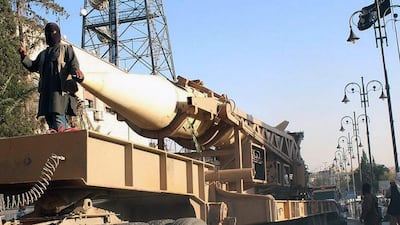BAGHDAD // Sometimes they came pretending to buy things. Sometimes they texted, sometimes they called, but the message was always the same: “Give us money.”
Months before they took control of Mosul in June, ISIL militants were busy collecting money to finance their campaign of setting up a 7th century-style “caliphate”.
The owner of a Mosul grocery store recounted how, when he hesitated to pay, militants exploded a bomb outside his shop.
“If a person still refused, they kidnapped him and asked his family to pay ransom,” he said.
The shopkeeper said he had paid the militants US$100 (Dh367) six or seven times this year.
In return, he was given a receipt that says: “Received from Mr. ...., the amount of ...., as support to the Mujaheddin.”
The shop keeper’s tale illustrates how Islamic State has long been systematically collecting funds for a land grab that already includes a stretch of northern Iraq and Syria.
Another Mosul worker corroborated the account of ISIL tactics.
“The tax system was well-organised. They took money from small merchants, petrol station owners, generator owners, small factories, big companies, even pharmacists and doctors,” said the shop owner who, out of frustration and fear, closed his store and is now trying to make a living as a taxi driver.
Learning from their previous incarnation as the Islamic State of Iraq, when they received money from foreign fighters, ISIL has almost weaned itself off private funds from sympathetic individual donors in the Gulf. Such money flows have come under increased scrutiny from the US Treasury.
Instead the group has formalised a system of internal financing that includes an Islamic form of taxation, looting and most significantly, oil sales, to run their ‘state’ effectively.
This suggests it will be harder to cut the group’s access to the local funding that is fuelling its control of territory and strengthening its threat to the Middle East and the West.
Nevertheless, financing from Gulf donors may prove more critical in months to come, if Barack Obama’s mission to “degrade and destroy” the group succeeds and the group loses territory and finds itself looking abroad for funds.
In the eastern Syrian city of Mayadin, an ISIL supporter who goes by the name of Abu Hamza Al Masri, said the militants had set up checkpoints in the past few months demanding money from passing cars and trucks. The money purportedly goes into a zakat fund, but Mr Al Masri admitted some sums go to pay bonuses or salaries of fighters.
“Passengers are asked to open their wallets ... in some instances they are threatened at gunpoint if they resist,” said Syrian secular activist in Deir ez-Zor.
But extortion is not Islamic State’s top money-spinner.
Analysts and activists say the majority of the group’s money comes from oil sales to local traders from wells under Islamic State control.
Luay Al Khatteeb, a visiting fellow at the Brookings Doha Centre who has done extensive research into ISIL’s oil smuggling, says the group now has access to five oilfields in Iraq, each of which have between 40 to 70 oil wells.
“They deal with a sophisticated network of middle men, some of whom are affiliated with the [Iraqi] oil companies. They have to pay various checkpoints to move around all these oil convoys and specifically to export the oil to Turkey,” Mr Al Khatteeb said.
“It is estimated that now, after recent territory losses, they can produce give or take 25,000 bpd, easily getting them about $1.2 million a day, on and off, even if they sell at a discount price of $25-$60 a barrel.”
A high-level Iraqi security official put the number of oilfields under the group’s control at four, with a fifth in contest between them and Kurdish peshmerga forces.
The group appears to have chosen areas of conquest carefully, with an eye to funding.
In the Syrian province of Raqqa, a stronghold of the group, the militants made sure they could effectively manage the area before moving on to conquer territory across the border in Iraq.
They moved into Fallujah in Iraq’s Anbar province in early 2014, before reaching Mosul in June, a major urban centre.
“It’s about controlling financial nodes. It’s controlling commercial centres, it’s controlling roads for checkpoints and there’s no surprise in that, because there’s significant value in that control. And the more finance you earn, the more you can develop. It’s a reinforcing circuit,” said Tom Keatinge, a finance and security analyst at the Royal United Services Institute.
“There’s no point in controlling acres of desert. You want to control the financial nodes so that you can continue to expand. You don’t want to spread yourself too thin financially before you can operate effectively in an expanded area.”
* Reuters

